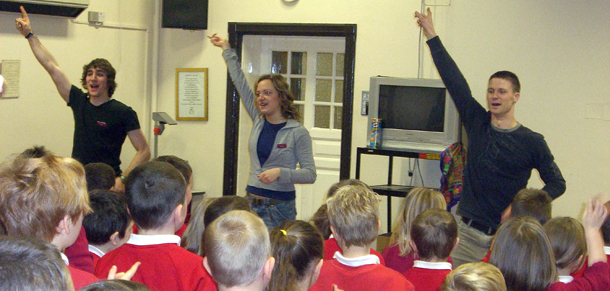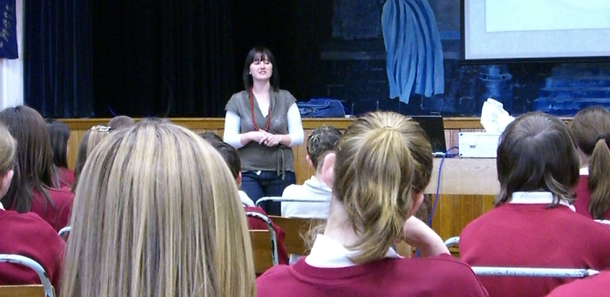Bible base
Matthew 2:11; John 3:16
Aim
To encourage students to remember that the reason for Christmas and presents is to celebrate the birthday of Jesus, God’s gift to the world.
Things you’ll need:
- Party hat, large birthday badge (eg ’18 today’).
- Five or six ‘presents’, eg small bags of sweets (optional, see ‘Note’).
- A CD which the age group would enjoy for a party.
- A bag of crisps.
- A can of drink.
- A CD of the carol you plan to use.
- Equipment to play the CD.
Preparation
- Before the assembly, wrap up the ‘presents’.
- Set up equipment for playing the CD in the assembly, and make sure it all works.
- ‘Party guest’ volunteers. Before the assembly, enlist the help of four or five volunteers and give them one of the ‘presents’. Explain briefly that you are going to ask them to the front, bringing their ‘present’ with them, and then to act as if they are enjoying a party. You will tell them what to do as the assembly progresses. You might like to ask the teacher responsible for the assembly to select ‘appropriate’ volunteers for you. See ‘Note’ at end of outline. (Optional)
Presentation
1 Start by talking about parties.
• Are they going to any parties this Christmas?
• Have they been to/had any good birthday parties?
2 Say that you want them to imagine how they would feel if the following happened at their birthday party.
(Put on a party hat yourself, badge with ’18 today’ etc at this point.)
Say that:
You are going to have a party. You invite your friends and they are all going to come. The food and drink look great.
(Bring out a token bag of crisps and can of drink!)
It’s all ready. Everyone comes.
(At this point, invite your ‘party guest’ volunteers to come to the front carrying their presents. Put on the CD, keeping volume low, so you can be heard. Encourage your volunteers to act as if they are at a party.)
Say that, all is going well. You notice that they’ve each brought a present with them – and you think, ‘Great – wonder what I’ve got!’
Then the music stops.
(Turn off the music.)
People start getting out their presents.
(Encourage your ‘party guests’ to look at their presents.)
You wait for them to give you the presents – after all, it is your birthday.
(Look excited.)
But they don’t. Your friends give each other the presents!
(Encourage your ‘party guests’ to give one another the presents and to unwrap them, dropping the paper on the floor, leaving you out.)
Ask, ‘How would you feel if this was your party?’
(Thank your volunteers and ask them to go back to their places.)
Say that the party is over. All your friends have gone and you have been left on your own with just the wrappings.
Reflection
1 Say that maybe that’s how Jesus feels about Christmas. Briefly comment on how there’s lots of partying at Christmas. Then ask, about the meaning of Christmas, ‘Whose birthday is it anyway?’
2 Talk about how today we often forget that Christmas is about celebrating Jesus’ birthday. We get preoccupied with thinking about the presents we’re going to give to other people, and what we’re going to get. This is a contrast to the first Christmas when Jesus was the centre of attention and three very special gifts were given to the baby. Briefly explain that gold was for a king, frankincense for a priest and myrrh, used in burial customs, reminds us of Jesus’ death.
3 Explain that Christians started giving gifts to each other at Christmas as a reminder and celebration of God’s gift of Jesus to the world. At this point, you could read from the Bible: John 3:16.
Response
1 In a time of quiet:
• Ask the students to think about the presents they plan to give, and the ones they hope to get. Encourage them to let every present, this Christmas, be a reminder of how God showed his love for us through his gift of Jesus to the world.
• Thank God for sending Jesus into the world for us.
• Ask the students if they can think of someone who is going to be left out of Christmas celebrations this year. Is there something they could do, or a gift they could give, to show them some of God’s love – just as God did for us when he sent Jesus.
2 You could finish the time of quiet by listening to a verse from a Christmas carol about God’s gift of Jesus at Christmas (eg the appropriates verse from ‘O Little Town of Bethlehem’, ‘The First Nowell’ or ‘We Three Kings’). Alternatively, you could read the words.
Wish everyone a very happy Christmas!
Note: If you don’t wish to involve volunteers or it’s not easy to do so, simply use the outline as above, omitting the sections about inviting volunteers to the front and instructions to them as you talk about the party. You can still set the scene by putting on the hat and badge yourself, playing the CD etc.

